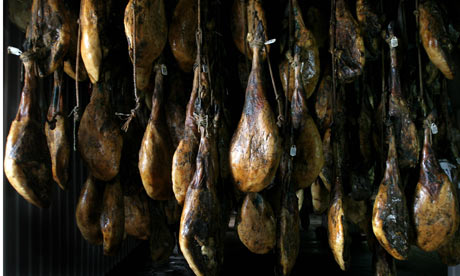
Large amounts of Iberian ham: a bad idea? Photograph: Karen Robinson
If you want to know the depth of my passion for jamon iberico, that incomparable Spanish ham, ask me who was the last person I pestered for an autograph. It wasn't a movie star, pop personality or even a celebrity chef. Such people hold little excitement for me. It was Felix Jose Martinez, known throughout Spain as 'el cortador de jamon', and recognised as one of the greatest exponents of the fine art of ham cutting.
At his restaurant, La Jamoneria in Zaragoza, I watched him carve small, thin slices of the ruby-coloured flesh from a leg attached to a stand, making sure it came with a thick band of fat flavoured with the acorns on which the pigs feed. He was a maestro just as skilled as any musician, and in Spain he is just as revered. I will freely admit that I giggled like a 12-year-old girl when I had my picture taken with him.
One taste tells you why. Jamon iberico de bellota is, in my opinion, the finest item of food anywhere on the planet. The leg is taken from a free-range black Iberian pig and matured for almost five years before it reaches your plate. It has a taste like no other food and lingers on the tongue like a fine wine. The fat is particularly prized, and the release of flavour as it melts in the mouth is one of the greatest eating moments anyone will ever experience.
Curing pork is not just popular in Spain, of course. People throughout Europe are proud of their swine-based products. Italian cuisine without salami, or the equally glorious prosciutto di San Daniele, would be unthinkable. French dining tables would be considered undressed without jambon de Bayonne and I certainly would not want to be the one to tell the Germans, Scandinavians or the inhabitants of eastern Europe that their menu was to be oink-free.
According to the World Cancer Research Fund, however, that is exactly what we should be doing. New advice from the charity warns parents that the presence of hams, salami and bacon in their child's lunch box could help develop bad habits, which could lead to problems in later life.
According to their research, more than 70g of processed meat (that's a measly three rashers of bacon to you and me, folks) a week could be a major contributor to the onset of bowel cancer in adults. They recommend that these items are replaced at school dinner time by 'poultry, fish, low-fat cheese or hummus' so that the next generation don't develop a ham habit.
It might be easy to dismiss the research, given that three rashers of bacon barely equates to a sandwich. It also doesn't help the cause that the other main strand of advice in the research is that parents should 'avoid lunch box fillers that are high in fat and calories and regularly including sugary drinks' which prompts an exclamation of the words 'pope', 'woods', 'bear' and 'Catholic', though not necessarily in that order.
It does raise the question, however, of whether we should impose our adult lifestyle choices on the next generation. Knowing what we do about alcohol and tobacco, we wouldn't slip a pack of 10 Benson & Hedges or a can of Carling in their Tupperware. So, given the recommendations, should we be taking the same precautions with processed meat?
I don't have kids and, being old enough to make my own decisions, will probably be eating more than 70g of jamon iberico within thirty seconds of finishing this piece. It will be worth the risk. But what about those of you with children? Will this advice compel you to take ham off the menu?
Ref: guardian.co.uk
